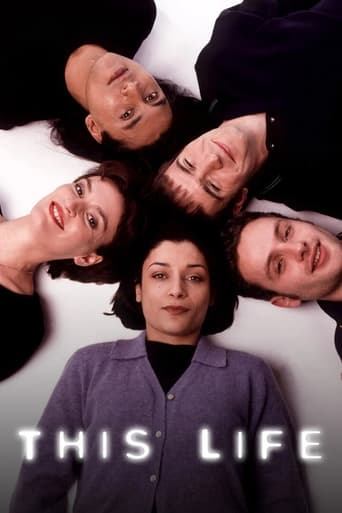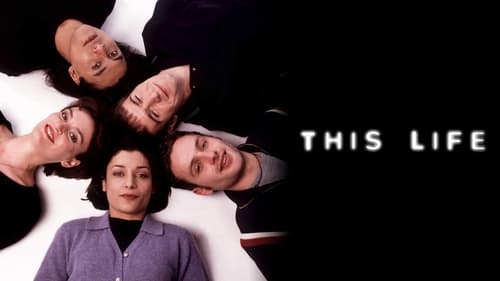Tom Clarke
Part of what made This Life such a landmark television series was its uncompromising trendiness – its utter refusal to comply with standard dramatic devices. The shaky camera, the rough cuts, the sex and the swearing were genuinely ground-breaking, which is why Amy Jenkins' decision to make a one-off comeback 10 years on has just a tinge of sell-out about it. I suppose this is how die-hard Beatles fans felt when Paul McCartney released the Frog Chorus.Still, getting a glimpse of the whole "what happened next?" thing is always intriguing. In This Life +10 the group of law graduates reunite for gay biker Ferdy's funeral. The cause of his demise remains unexplained (maybe Ramon Tikaram was busy that day) though we do learn that he got it together with Welsh milksop Warren (Jason Hughes) in the years following the end of the series.It is swiftly apparent however that the five original housemates have drifted apart: Anna (Daniella Nardini) is the only practising lawyer and has quickly motored up the ranks of high-class defence attorneys; Miles (Jack Davenport) has acquired a country mansion, a hotel business and a Vietnamese bride; Egg (Andrew Lincoln) has written a best-selling novel based on the gang's experiences and is still with Milly (Amita Dhiri) who has popped a sprog; and Warren is dealing with Ferdy's death admirably thanks to his burgeoning career as a life coach/self help guru.Egg's status as a celebrity author prompts a sexy young filmmaker to organise a reunion between the flatmates at Miles's stately pile as part of a fly-on-the-wall documentary, and this is where the faintly absurd amateur psychology and pent-up tension begins to emerge.But, hey, this is a study in recent social history after all and Jenkins just about gets away with the clichéd set-up largely thanks to the edginess of the group dynamic (which is still as well observed as ever) and the chemistry between Lincoln and Davenport whose old buddy routine provides just about the only realistic friendship of the whole lot of them.Frankly the whole project is little more than an excuse to drum up the old neuroses and insecurities that plague those trying to come to terms with lost youth: Career woman versus housewife? Playboy versus responsible adult? Clapham Common cottager versus weird, over-analysing sperm donor? They are the identity crises that face us all… Still – there is much to enjoy. The soundtrack to Egg's ostentatious cooking routines and the group's booze-fuelled slanging matches has shifted from Massive Attack and Portishead to The Killers and Kaiser Chiefs – the use of contemporary music once again proving integral to This Life's success - but, in a nice conceit, as the action comes to a climax, the whole gang dance around like middle-aged loons to the Manic Street Preachers. Clearly these are nineties children at heart.Whether intentional or not, there is a spooky symmetry between the fates of the characters and their real life alter egos. Miles's success in industry and Egg's fame mirror the career paths of Davenport and Lincoln who clearly didn't need this nostalgic trip down memory lane as much as the others and it is a tribute to their evident respect for Jenkins and the original series that they agreed to the reunion at all.The biggest problem with the show has always been empathy. These people are egotistical, hopelessly unstable and borderline unlikeable - but they perfectly bring out the screwed-up wretch in all of us. One can easily forgive Jenkins her indulgence, for This Life +10 is a triumph of reminiscence and guilty pleasures.
Tom May
Ah, now here's a series I am in a few minds about, and that I have changed my mind over over time. I feel that the seemingly universal tide of praise this show gets needs a little tempering.It was generally well written, but rarely brilliant. The acting likewise was mostly good in a naturalistic way, with Andrew Lincoln good as Egg, veering between genuinely likeable and a little irritating, Jason Hughes as Warren proving the making of the show in many ways; a well-written gay character impressively acted. Definitely pointed the way to "Queer as Folk" to some degree. Daniella Nardini was of course, a delicious, refreshing presence, though I do feel the character became a bit of a self-parody in some of the later episodes of the long Series Two. Likewise to some extent, Miles becomes less interesting as the overlong Series Two goes on, though overall Jack Davenport does a good job in portraying an infuriating, smug cad. Natasha Little I do like, but then that's my own peculiar penchant for her strangely alluring ice maiden, the subtle "bitch" they just call "Rachel"... ;-) On the whole it was good ensemble acting, certainly a lot better than in the shows imitating "This Life". While you may feel it a mite unfair, I would bring up the show's influence on British TV since it finished in 1997, with endless shows hung up over largely Southern middle-class repellants. Largely, these shows have duller characters and more annoying dialogue than "This Life", and I am talking "Teachers" and that neurotic, depressing, incredibly po-faced, glorified soap "Attachments". Only "Queer as Folk" can stand as a good programme, but then that was in many ways a far more groundbreaking series than "This Life", even if it too did suffer some diminishing returns with its follow-up special. Suffice it to say that the writers and actors of "This Life" have been involved in quite a few things since, but well, not too many TV programmes I can put names to. Amy Jenkins, the show's creator, but not actually the script writer of too many episodes, has claimed a large amount of the credit for it, and went on to do some badly received work in the film and novel fields.It certainly is a question; how groundbreaking was "This Life"? I doubt you could say it alone "led the way" in breaking more taboos as regarding language, sexuality and sex itself, though perhaps it became in a sense "the programme of a generation", attracting a youth audience that perhaps hadn't been so targeted by drama series before. Oh, and of course, it "pioneers" in jerky, neurotic camerawork. Pioneering perhaps in the context of British TV drama, but then what about Woody Allen's 1992 film, "Husbands and Wives"?Mention of that film indeed prompts me to reflect that "This Life" lacked a sustained wit... yes, at times Anna and Warren are witty characters in a waspish vein, but... well, I suppose this goes with the territory of drama that is primarily going for realism, trying to capture the behaviour of mid-twenties professionals. I do get the impression that "This Life" will to some extent date, and will not have quite the same impact as it did on a first viewing, back in 1996-97.I was a massive fan of it then, but can now see its faults a little more objectively. Series One I believe still stands up very well, with the show still fresh and unlike Series Two, actually focusing a bit on their actual work as lawyers, rather than just their personal lives. When Warren leaves in Series Two it goes downhill, with perhaps the endless agonizing of Milly over Rachel and some newer characters not quite interesting so much. I feel it became too much of a superior middle class soap, too predictable and set in its ways. Yes, the last episode is a corker in many respects. It actually does tie it up in a satisfying manner - where *would* it have gone from there?! Though that's not quite so compelling a question as with "Twin Peaks"' ending. It's a fine, revitalizing episode to the series, but by no means one of the few best episodes of UK TV television - heck, has no one seen "The Singing Detective", "Edge of Darkness", "The Prisoner", "Shooting the Past", "GBH" or "Brass Eye"? Anyway, while I would certainly accept that "This Life" defined a particular era in a way, it was a limited drama series, certainly no work of genius or great invention. Good television, but perhaps not so lasting television.Rating:- *** 1/2/*****
Malc-3
I still hold firmly to the belief that the last episode of this landmark show is the best 40 mins of British TV drama ever. Any number of storylines coming sharply to a head, the terrific wedding reception with its toilet sex and terrible dancing, darkest secrets coming horrifyingly to light and the legendary punch. But how sad! If we'd known then that there would never be another series we would have stormed the BBC ourselves. But think positive. The show is endlessly rewatchable, and its influence has lived on in Queer as Folk, Attachments, Teachers, Metropolis, Tinsel Town and most contemporary drama since.Just please, please publish the damn scripts!




